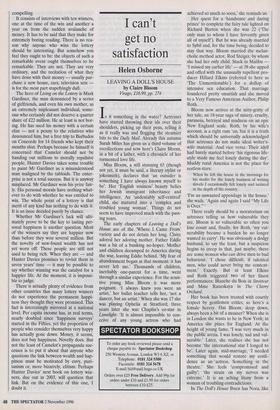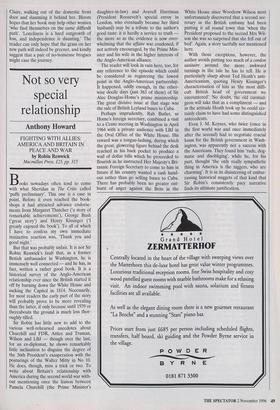I can't get no satisfaction
Helen Osborne
LEAVING A DOLL'S HOUSE by Claire Bloom Virago, £16.99, pp. 274 Is it something in the water? Actresses have started throwing their ids over their shoulders, picking up their pens, telling it as it really was and flogging the steamier bits to the Daily Mail. Already this autumn Sarah Miles has given us a third volume of recollections and now here's Claire Bloom, in a bit of a lather, with a chronicle of her tormented love life.
Miss Bloom, a still stunning 65 (though not yet, it must be said, a literary stylist or jokesmith), declares that 'an outsider is something I have always known myself to be'. Her 'English rosiness' beauty belies her Jewish immigrant inheritance and intelligence. An 'undeniably self-centred' child, she matured into a 'complex and troubled young woman'. Things do not seem to have improved much with the pass- ing years.
The early chapters of Leaving a Doll's House are of the 'Where I Came From' variety and do not detain her long. Claire adored her adoring mother. Father Eddie was a bit of a bunking no-Koper. Mother and children decamped to America during the war, leaving Eddie behind. 'My fear of abandonment began at that moment: it has never left me.' Thousands of children, inevitably one-parent for a time, went through a similar experience. For the sensi- tive young Miss Bloom it was more poignant. 'I always knew you were an artist,' her ballet teacher tells her, not a dancer, but an artist.' When she was 17 she was playing Ophelia at Stratford; three years later she was Chaplin's co-star in Limelight: 'It is almost impossible to con- ceive of any young actress who had achieved so much so soon,' she reminds us.
Her quest for a 'handsome and daring prince' to complete the fairy tale lighted on Richard Burton when she was 22 (`The only man to whom I have fervently given all of myself). But he was already married to Sybil and, for the time being, decided to stay that way. Bloom married the melan- cholic method actor, Rod Steiger, by whom she had her only child. Stuck in Malibu 'I missed my earlier life' — at 38 she upped and offed with the unusually repellent pro- ducer Hillard Elkins (referred to here as `The Unmentionable') for a dollop of intensive sex education. That marriage foundered pretty smartish and she moved to a Very Famous American Author, Philip Roth.
Bloom now arrives at the nitty-gritty of her tale, an 18-year saga of misery, cruelty, paranoia, betrayal and madness on an epic New England scale. Roth, by his wife's account, is a right rum 'un, but it is a truth which should be universally acknowledged that actresses do not make ideal writer's- wife material. And vice versa. Their idyll had barely started before 'his rigorous life- style made me feel lonely during the day'. Muddy rural America is not the place for restless stars:
When he left the house in the mornings for his studio for the lonely business of writing tiovels I occasionally felt lonely and isolated in the depth of the country.
`I'm an unwanted appendage in the house,' she wails. 'Again and again I said "My Life is Over." ' There really should be a moratorium on actresses telling us how vulnerable they are. Bloom is so vulnerable so often you lose count and, finally, for Roth, 'my vul- nerability became a burden he no longer wanted to carry'. He was obviously a dodgy husband, to say the least, but a suspicion begins to creep in that, just maybe, there are some women who can drive men to bad behaviour. 'I chose difficult, if talented men, who could never bring me content- ment.' Exactly. But at least Elkins and Roth triggered two of her finest performances: Blanche du Bois in Streetcar and Mme Raneskaya in The Cherry Orchard.
Her book has been treated with courtly respect by gentlemen critics, so here's a female heresy. Has Bloom, deep down, always been a bit of a moaner? When she is in London she wants to be in New York; in America she pines for England. At the height of young fame, 'I was very much in the public arena. I was lonely, sad and vul- nerable.' Later, she realises she has not become 'the international star I longed to be'. Later again, mid-marriage, needed something that would restore my confi- dence as an actress. Something in the theatre.' She feels 'compromised and guilty'; 'the strain on my nerves was extreme.' It is an aching litany from a woman of troubling contradictions.
In The Doll's House Ibsen has Nora, like Claire, walking out of the domestic front door and slamming it behind her. Bloom hopes that her book may help other women 'who find themselves on the same difficult path'. 'Loneliness is a hard outgrowth of loss, and independence is daunting.' The reader can only hope that the grass on her new path will indeed be greener, and kindly suggest that a pair of no-nonsense brogues might ease the journey.



















































































 Previous page
Previous page